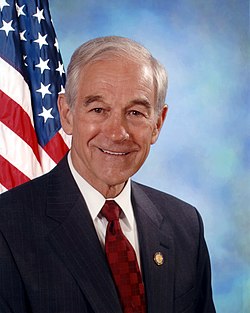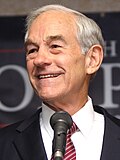Electoral history of Ron Paul Last updated June 18, 2025 Texas's 22nd congressional district , 1974 : [ 1]
Texas's 22nd congressional district , 1976 (special election) : [ 2]
Texas's 22nd congressional district , 1976 (special election runoff) : [ 3]
Texas's 22nd congressional district , 1976 : [ 4]
Robert Gammage (D) – 96,535 (50.07%) Ron Paul (R) (inc.) – 96,267 (49.93%) Texas's 22nd congressional district , 1978 : [ 5]
Ron Paul (R) – 54,643 (50.56%) Robert Gammage (D) (inc.) – 53,443 (49.45%) Texas's 22nd congressional district , 1980 : [ 6]
Texas's 22nd congressional district , 1982 : [ 7]
Ron Paul (R) (inc.) – 66,536 (100.00%)Republican primary for the United States Senate from Texas, 1984 : [ 8]
1988 presidential election 1987 Libertarian National Convention : [ 9]
1988 North Dakota Libertarian presidential primary : [ 10]
1988 United States presidential election :
George H. W. Bush /Dan Quayle (R) – 48,886,597 (53.4%) and 426 electoral votes (79.18%, 40 states carried) Michael Dukakis /Lloyd Bentsen (D) – 41,809,476 (45.6%) and 111 electoral votes (20.63%, 10 states and D.C. carried) Lloyd Bentsen /Michael Dukakis (D) – 1 electoral vote (0.19%, West Virginia faithless elector ) Ron Paul /Andre Marrou (LBT) – 431,750 (0.5%) Lenora Fulani (New Alliance) – 217,221 (0.2%) Others – 249,642 (0.3%) Texas's 14th congressional district , 1996 (Republican primary) : [ 11]
Texas's 14th congressional district , 1996 (Republican primary runoff) : [ 11]
Ron Paul – 11,244 (54.06%)Greg Laughlin (inc.) – 9,555 (45.94%) Texas's 14th congressional district , 1996 : [ 11]
Texas's 14th congressional district , 1998 : [ 11]
Ron Paul (R) (inc.) – 84,459 (55.25%) Loy Sneary (D) – 68,014 (44.49%) Write-in – 390 (0.26%) Texas's 14th congressional district , 2000 : [ 11]
Ron Paul (R) (inc.) – 137,370 (59.71%) Loy Sneary (D) – 92,689 (40.29%) Texas's 14th congressional district , 2002 : [ 11]
Ron Paul (R) (inc.) – 102,905 (68.09%) Corby Windham (D) – 48,224 (31.91%) Texas's 14th congressional district , 2004 : [ 11]
Ron Paul (R) (inc.) – 173,668 (100.00%) Texas's 14th congressional district , 2006 (Republican primary) : [ 11]
Texas's 14th congressional district , 2006 : [ 11]
Ron Paul (R) (inc.) – 94,380 (60.19%) Shane Sklar (D) – 62,429 (39.81%) Texas's 14th congressional district , 2008 (Republican primary) : [ 11]
Ron Paul (inc.) – 37,777 (70.43%) Chris Peden – 15,859 (29.56%) Texas's 14th congressional district , 2008 : [ 11]
Ron Paul (R) (inc.) – 191,293 (100.00%) Texas's 14th congressional district , 2010
2008 presidential election Iowa Republican straw poll , 2008 : [ 12]
Republican New Hampshire Vice Presidential primary , 2008 : [ 13]
(* – write in)
Liberty Union Party presidential primary, 2008 : [ 14]
Constitution Party presidential primaries, 2008 : [ 15]
Minnesota Independence Party presidential caucus, 2008 : [ 16]
2008 Libertarian National Convention (Presidential tally) : [ 17]
First ballot:
Second ballot:
Third ballot:
Sixth ballot:
Republican presidential primaries, 2008 : [ 18]
John McCain – 9,926,234 (46.80%) Mitt Romney – 4,663,847 (21.99%) Mike Huckabee – 4,280,723 (20.18%) Ron Paul – 1,210,022 (5.71%) Rudy Giuliani – 597,494 (2.82%) Fred Thompson – 294,607 (1.39%) Uncommitted – 70,866 (0.33%) Alan Keyes – 59,637 (0.28%) Scattering – 42,822 (0.20%) Duncan Hunter – 39,895 (0.19%) Tom Tancredo – 8,595 (0.04%) John Cox – 3,351 (0.02%) Sam Brownback – 2,838 (0.01%) 2008 Republican National Convention (Presidential tally) : [ 19]
2008 United States presidential election :
Barack Obama /Joe Biden (D) – 69,498,215 (52.91%) and 365 electoral votes (28 states+D.C. +NE-02 carried) John McCain /Sarah Palin (R) – 59,948,240 (45.66%) and 173 electoral votes (22 states carried) Ralph Nader /Matt Gonzales (I) – 738,475 (0.56%) Bob Barr /Wayne Allyn Root (LBT) – 523,686 (0.40%) Chuck Baldwin /Darrell Castle (CST) – 199,314 (0.15%) Cynthia McKinney /Rosa Clemente (Green) – 161,603 (0.12%) Alan Keyes /Brian Rohrbough – 47,694 (0.04%) Ron Paul /With Multiple VP candidates – 42,426 (0.03%) Gloria La Riva /Eugene Puryear (Socialism & Liberation) – 6,808 (0.01%) Brian Moore /Stewart Alexander (Socialist) – 6,528 (0.01%) 2012 presidential election Iowa Republican straw poll , 2011 : [ 20] [ 21]
Republican New Hampshire Vice Presidential primary , 2012 : [ 22]
2012 Libertarian National Convention (Presidential tally) : [ 23]
Republican presidential primaries, 2012 : [ 24]
Mitt Romney - 10,031,336 (52.13%) Rick Santorum - 3,932,069 (20.43%) Newt Gingrich - 2,734,571 (14.21%) Ron Paul - 2,095,762 (10.89%) Rick Perry - 54,769 (0.28%) Jon Huntsman, Jr. - 83,918 (0.44%) Michele Bachmann - 41,199 (0.21%) 2012 Republican National Convention (Presidential tally) : [ 24]
2012 United States presidential election : [ 25]
Barack Obama /Joe Biden (D) - 65,915,796 (51.06%) Mitt Romney /Paul Ryan (R) - 60,933,500 (47.20%) Gary Johnson /James P. Gray (Libertarian ) - 1,275,971 (0.99%) Jill Stein /Cheri Honkala (Green ) - 469,627 (0.36%) Virgil Goode /Jim Clymer (Constitution ) - 122,388 (0.09%) Roseanne Barr /Cindy Sheehan (Peace and Freedom ) - 67,326 (0.05%) Rocky Anderson /Luis J. Rodriguez (Justice ) - 43,018 (0.03%) Tom Hoefling /Jonathan D. Ellis (America's Party) - 40,628 (0.03%) Ron Paul - 26,204 (0.02%)Others - 190,944 (0.15%) 2016 Presidential Election Though not a candidate in the 2016 United States presidential election, Ron Paul received one vote in the electoral college. Paul also received a vote on the first ballot at the Libertarian Party National Convention's nomination for President. References ↑ "Our Campaigns - TX District 22 Race - Nov 05, 1974" . ↑ "Our Campaigns - TX District 22 - Special Election Race - Feb 28, 1976" . ↑ "Our Campaigns - TX District 22 - Special Runoff Race - Apr 03, 1976" . ↑ "Our Campaigns - TX District 22 Race - Nov 02, 1976" . ↑ "Our Campaigns - TX District 22 Race - Nov 07, 1978" . ↑ "Texas Almanac, 1982-1983" . 1981. ↑ "Our Campaigns - TX District 22 Race - Nov 02, 1982" . ↑ "Our Campaigns - TX US Senate - R Primary Race - May 05, 1984" . ↑ "Our Campaigns - US President - LBT Convention Race - Sep 05, 1987" . ↑ "Our Campaigns - ND US President - LBT Primary Race - Jun 14, 1988" . 1 2 3 4 5 6 7 8 9 10 11 "1992 – Current Election History" . Texas Secretary of State. Archived from the original on 2014-01-09. Retrieved 2009-03-07 . ↑ "Our Campaigns - Iowa GOP Presidential Straw Poll Race - Aug 11, 2007" . ↑ "Our Campaigns - NH US Vice President - R Primary Race - Jan 08, 2008" . ↑ "Our Campaigns - VT US President - LBU Primary Race - Mar 04, 2008" . ↑ "Our Campaigns - US President - CST Primary Race - Feb 05, 2008" . ↑ "Our Campaigns - MN US President - MNI Caucus Race - Feb 05, 2008" . ↑ "Our Campaigns - US President - LBT Convention Race - May 25, 2008" . ↑ "Our Campaigns - US President - R Primaries Race - Jan 03, 2008" . ↑ "Our Campaigns - US President - R Convention Race - Sep 01, 2008" . ↑ Bachmann wins Ames straw poll Archived 2011-11-13 at the Wayback Machine ↑ Kiely, Kathy (August 13, 2011). "Iowa Straw Poll: Complete Results - Hotline On Call" . Hotlineoncall.nationaljournal.com. Archived from the original on November 4, 2011. Retrieved September 19, 2011 . ↑ "Manual for the General Court" . 2013. ↑ "Our Campaigns - US President - LBT Convention Race - May 05, 2012" . 1 2 "Republican Convention 2012" . ↑ "Election and voting information" (PDF) .
Legislation Books Organizations Related
This page is based on this
Wikipedia article Text is available under the
CC BY-SA 4.0 license; additional terms may apply.
Images, videos and audio are available under their respective licenses.


